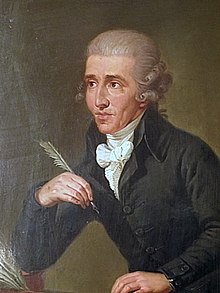Missa brevis Sancti Joannis de Deo
| Missa brevis Sancti Joannis de Deo | |
|---|---|
| Mass by Joseph Haydn | |

The composer c. 1770, Portrait by Ludwig Guttenbrunn
|
|
| Other name | Little Organ Mass |
| Key | B-flat major |
| Catalogue | Hob. XXII:7 |
| Composed | 1770s |
| Movements | 6 |
| Vocal |
|
| Instrumental |
|
The Missa brevis Sancti Joannis de Deo, Hob. XXII:7, Novello 8, is a mass in B-flat major by Joseph Haydn. The missa brevis (short mass) was written around 1775 for the order of the Barmherzige Brüder (Brothers Hospitallers) in Eisenstadt, whose patron saint was John of God. Scored modestly for soprano, four-part mixed choir, two violins, organ and bass, it is known as the Kleine Orgelsolomesse (Little Organ Mass) due to an extended organ solo in the Benedictus movement.
Haydn composed four or five short masses, depending on the Missa brevis Rorate coeli desuper being composed by him or not. The Missa brevis Sancti Joannis de Deo is his last missa brevis. All these short masses share a modest orchestra.
The mass was written for the order of the Barmherzige Brüder, also called Brothers of Mercy, in Eisenstadt, Hungarian Kingdom (now Austria), whose founder and patron saint was St. John of God. Haydn lived in Eisenstadt, working for the court of Nikolaus II, Prince Esterházy. The date of the composition is not certain because the autograph score bears no date. A year of 1778 or earlier in the 1770s seems likely. Because of an extensive Organ solo in the Benedictus, it is known as the Kleine Orgelsolomesse (Little Organ Mass), referring to the Große Orgelsolomesse (Great Organ Mass), a colloquial name for the Missa in honorem Beatissimae Virginis Mariae, Haydn's fourth mass in E-flat major. An organ solo in the Benedictus was common practice at the time.
...
Wikipedia
